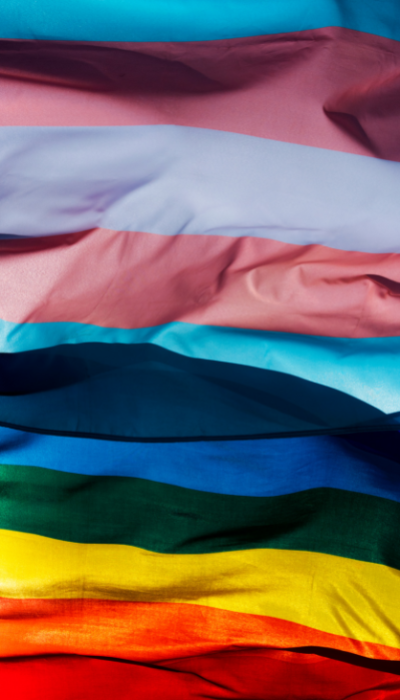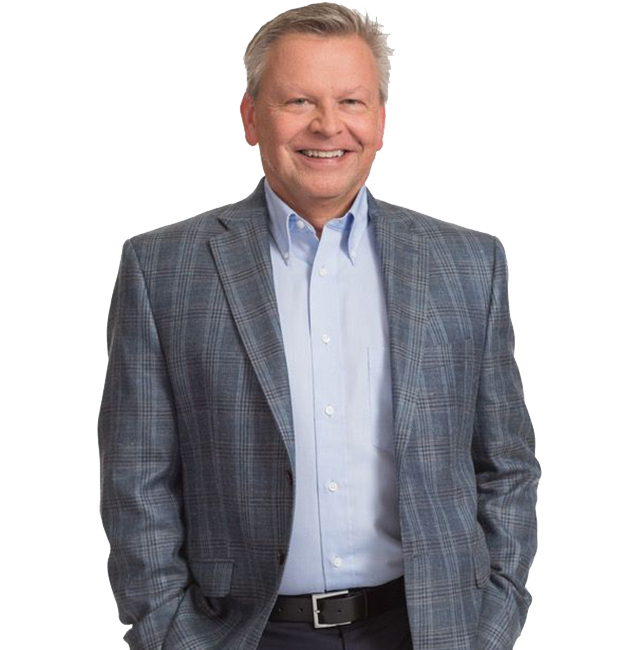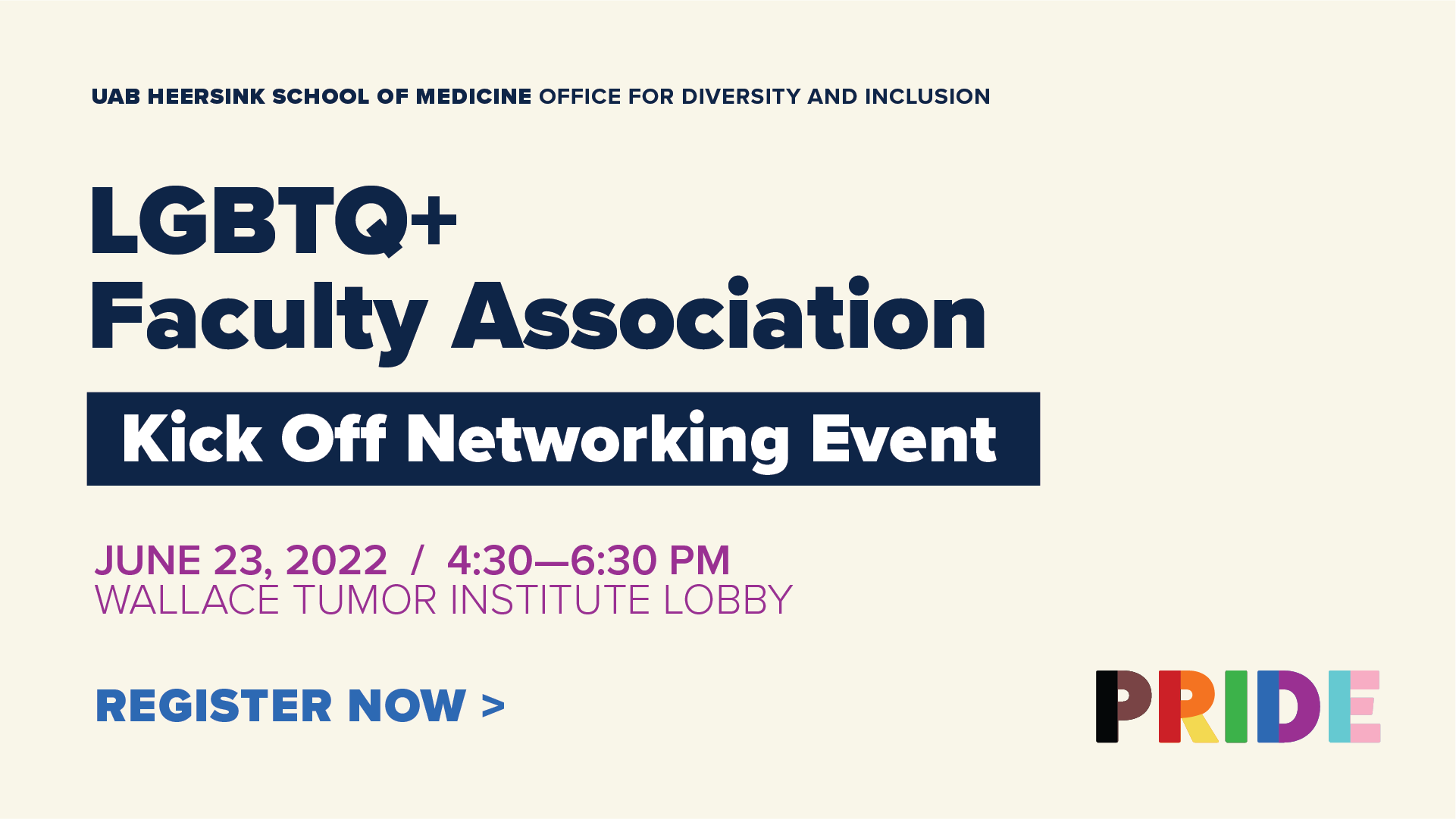 The Heersink School of Medicine Office for Diversity and Inclusion wants to create an environment that supports and nurtures its faculty members. To do this, the office establishes faculty associations to encourage, network, mentor, and serve as a voice for cultural and educational concerns among the faculty. In strategic planning sessions for the office, discussions to create a faculty association dedicated to the LGBTQ+ community and its allies were in progress.
The Heersink School of Medicine Office for Diversity and Inclusion wants to create an environment that supports and nurtures its faculty members. To do this, the office establishes faculty associations to encourage, network, mentor, and serve as a voice for cultural and educational concerns among the faculty. In strategic planning sessions for the office, discussions to create a faculty association dedicated to the LGBTQ+ community and its allies were in progress.
During this time, Rodney Tucker, M.D., professor and director of the UAB Center for Palliative and Supportive Care, reached out to the Office for Diversity and Inclusion to inquire about creating an LGBTQ+ Faculty Association. With his leadership, a partnership formed to bring this idea to life.
"You can't get to 200 members without first getting to two," Tucker said. "The time to start building a faculty association is now."
The founders of the association includes a core group of approximately 20 faculty members from various departments. To create a safe and protected environment for its members, the group will be open to faculty at the school, including the LGBTQ+ community and its allies.
After months of planning, organizing, and collaborating with faculty across the school, the group is prepared to launch. As a part of its introduction, faculty are invited to attend the kickoff networking event on June 23, 2022 from 4:30 – 6:30 p.m. at the Wallace Tumor Institute Lobby.
The LGBTQ+ Faculty Association marks the Heersink School of Medicine's Office for Diversity and Inclusion's fourth faculty association — accompanied by the Black/African American, Hispanic and Latin American, and Asian American & Pacific Islander groups. Each group is encouraged to create a mission and vision specific to the needs of its members.
About the LGBTQ+ Faculty Association
The LGBTQ+ Faculty Association will connect, collaborate, and contribute to a greater understanding, support, and advocacy for members of the LGBTQ+ faculty and allies. To do this, the faculty association will adopt principles of holistic diversity, equity, and inclusion within the school and healthcare community. This mission will be evident by ways of:
Encouraging communication, networking, and professional development opportunities for faculty in the Heersink School of Medicine identifying as part of the LGBTQ+ community.
"I hope that this group not only meets offsite and after hours to encourage networking and development among UAB faculty but also brings activities within the community and at a national level into the fold," Tucker said. "We can use this association as a platform to discover educational experiences, leadership opportunities, and certificate programs and bring them to UAB."
Promoting interdisciplinary research and advancing the knowledge based in LGBTQ+ issues and disparities.
A critical function of the faculty association will be to connect and promote the research done by its members and that regarding the LGBTQ+ community. This connectivity aims to fuel more collaborative partnerships within the institution, among investigators' career stages, and those needing sexual orientation and gender identity data.
By promoting an environment of education and research discovery, the group hopes to bridge the gap between what is known and unknown about LGBTQ+ cultural differences and disparities.
Serving as mentors and advocates for other faculty in various stages of their careers and learners at all levels who are engaged in the community.
"I've had great mentors, but they have all been topic- or career-stage-based," Tucker said. "Should the faculty member choose to, having people who participate in mentorship programs such as UAB Connect is an intentional indication that the school is investing and providing support via access to its LGBTQ+ faculty members."
The Office for Diversity and Inclusion's Student Affairs team has pioneered UAB Connect, a mentorship portal designed to make it easier for students and residents from underrepresented backgrounds to find and connect with mentors who share similar experiences.
"I would hope faculty members will find mentorship rewarding even later in their career. In a sense, these faculty will be trailblazers," added Tucker.
About Dr. Tucker
 Rodney Tucker, M.D.An Alabama native, Tucker attended the University of Alabama at Birmingham for his undergraduate degree. After starting as an English major, with a Social Work minor, Tucker switched to a Biology major with minors in Chemistry and Social work. He decided to challenge himself and his love for science and people by obtaining one of the most challenging degrees — M.D.
Rodney Tucker, M.D.An Alabama native, Tucker attended the University of Alabama at Birmingham for his undergraduate degree. After starting as an English major, with a Social Work minor, Tucker switched to a Biology major with minors in Chemistry and Social work. He decided to challenge himself and his love for science and people by obtaining one of the most challenging degrees — M.D.
Tucker continued his education at the Heersink School of Medicine. Upon completion, he trained at a community-based hospital. Immediately, Tucker was assisting elderly, sick patients.
"As the new internist, I didn't have a full schedule, so I could easily spend 45 minutes with them," explained Tucker. "I saw first-hand the social determinants of care — which dictated the patient's compliance."
Using synergy from his early interest as a social worker, Tucker found his passion for helping people through palliative care. However, with no palliative care fellowship programs at the time, Tucker decided to self-train and became board certified.
In 1992, after serving as Chief Resident, Tucker opened a private practice where he stayed until coming to UAB in 2002.
"When I was at my private practice, my husband worked at the same hospital. Close friends, colleagues, and most medical staff knew of our long-term relationship, but patients didn't know," recalled Tucker.
According to Gallup, in 1997, only 27% of people approved of same-sex marriage. Those numbers are now at an all-time high, with 70 percent of people supporting. "That's a tremendous change, but you know what, the remaining 30 percent can be reduced further. There is more work to be done, and now is the time to do this together."
As a driving force for not only Tucker's career but his determination to see the creation of an LGBQT+ Faculty Association, is his disposition for compassion and action.
Tucker advises everyone going into pride month to:
1) Include personal pronouns after your name on Zoom and email
2) Read about the Magic City Wellness Center, Magic City Acceptance Academy, and AIDS Alabama.
3) Attend a Pride event with friends or family.
4) Learn one fact this month about LGBTQ+ inequities. You can start here or;
5) Keep up with the Heersink School of Medicine Office for Diversity and Inclusion’s Pride Month campaign—there is a lot to learn!
Tucker finished with, "Launching the faculty association is like unveiling the curtain — it's gradual. Hopefully, as we begin, people will feel safe to join and see the value and impact the group can have. The establishment of this faculty association represents the next step in the growth and evolution of our diversity, equity, and inclusion efforts at UAB.”

